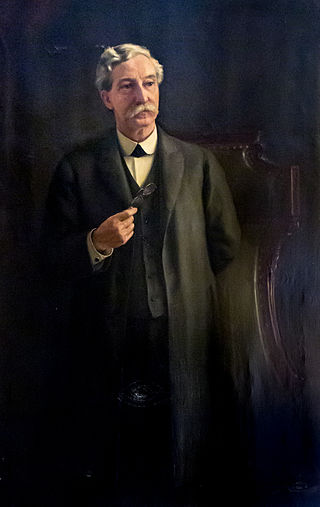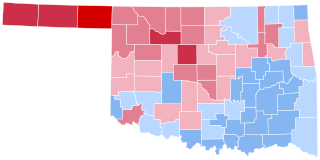
Bourbon Democrat was a term used in the United States in the later 19th century and early 20th century (1872–1904) to refer to members of the Democratic Party who were ideologically aligned with fiscal conservatism or classical liberalism, especially those who supported presidential candidates Charles O'Conor in 1872, Samuel J. Tilden in 1876, President Grover Cleveland in 1884, 1888, and 1892 and Alton B. Parker in 1904.
The Massachusetts Republican Party (MassGOP) is the Massachusetts branch of the U.S. Republican Party.

Lucius Fayette Clark Garvin was an American physician and the 48th Governor of Rhode Island from 1903 to 1905. He also served many terms in the Rhode Island House of Representatives and several terms in the Rhode Island Senate.

The 1900 New York state election was held on November 6, 1900, to elect the governor, the lieutenant governor, the Secretary of State, the state comptroller, the attorney general, the state treasurer and the state engineer, as well as all members of the New York State Assembly and the New York State Senate.

The 1874 New York state election was held on November 3, 1874, to elect the governor, the lieutenant governor, a judge of the New York Court of Appeals, a Canal Commissioner and an Inspector of State Prisons, as well as all members of the New York State Assembly and one member of the New York State Senate.
Since the Great Depression, Rhode Island politics have been dominated by the Rhode Island Democratic Party, and the state is considered part of the Democrats' "Blue Wall." Democrats have won all but four presidential elections since 1928, with the exceptions being 1952, 1956, 1972, and 1984. The Rhode Island Republican Party, although virtually non-existent in the Rhode Island General Assembly, has remained competitive in gubernatorial elections, having won one as recently as 2006. Until 2014, Democrats had not won a gubernatorial election in the state since 1992, and it was not until 2018 that they won one by double digits. The Rhode Island General Assembly has continuously been under Democratic control since 1959.

The 1875 New York state election was held on November 2, 1875, to elect the Secretary of State, the State Comptroller, the Attorney General, the State Treasurer, the State Engineer, a Canal Commissioner and an Inspector of State Prisons, as well as all members of the New York State Assembly and the New York State Senate.

The 1996 United States presidential election in Oklahoma took place on November 5, 1996. All fifty states and the District of Columbia, were part of the 1996 United States presidential election. Voters chose eight electors to the Electoral College, which selected the president and vice president. Oklahoma was won by Kansas Senator Bob Dole, who was running against incumbent United States President Bill Clinton of Arkansas. Clinton ran a second time with former Tennessee Senator Al Gore as vice president, and Dole ran with former New York Congressman Jack Kemp.

The 1924 United States Senate special election in Colorado took place on November 4, 1924, to fill the remainder of the term for which Samuel D. Nicholson was elected in 1920. Nicholson died in office on March 24, 1923, and Democratic Governor William Ellery Sweet appointed Alva B. Adams, a prominent Pueblo attorney, to fill the vacancy. Adams, however, declined to be a candidate in the special election, instead challenging incumbent Republican Senator Lawrence C. Phipps in the regular election the same year.

The 1938 Colorado gubernatorial election was held on November 8, 1938. Republican nominee Ralph Lawrence Carr defeated Democratic incumbent Teller Ammons with 59.50% of the vote.

The 1905 Rhode Island gubernatorial election was held on November 7, 1905. Incumbent Republican George H. Utter defeated Democratic nominee Lucius F. C. Garvin with 53.30% of the vote.

The 1904 Rhode Island gubernatorial election was held on November 8, 1904. Republican nominee George H. Utter defeated Democratic incumbent Lucius F. C. Garvin with 48.94% of the vote.

The 1903 Rhode Island gubernatorial election was held on November 3, 1903. Incumbent Democrat Lucius F. C. Garvin defeated Republican nominee Samuel Pomeroy Colt with 49.29% of the vote.

The 1901 Rhode Island gubernatorial election was held on November 5, 1901. Incumbent Republican William Gregory defeated Democratic nominee Lucius F. C. Garvin with 53.64% of the vote.

The 1902 Massachusetts gubernatorial election was held on November 4, 1902. Incumbent Republican Governor W. Murray Crane did not run for re-election. Lt. Governor John L. Bates was elected to succeed him, defeating Democratic nominee William A. Gaston and Socialist John C. Chase.

The 1882 Rhode Island gubernatorial election was held on April 5, 1882. Incumbent Republican Alfred H. Littlefield defeated Democratic nominee Horace A. Kimball with 64.78% of the vote.

The 1881 Rhode Island gubernatorial election was held on April 6, 1881. Incumbent Republican Alfred H. Littlefield defeated Democratic nominee Horace A. Kimball with 66.97% of the vote.

The 1880 Rhode Island gubernatorial election was held on April 7, 1880. Republican nominee Alfred H. Littlefield defeated Democratic nominee Horace A. Kimball with 44.82% of the vote.

The 1912 Iowa Senate elections took place as part of the biennial 1912 United States elections. Iowa voters elected state senators in 29 of the senate's 50 districts. State senators serve four-year terms in the Iowa Senate.

The 1902 Arkansas gubernatorial election was held on September 1, 1902.



















